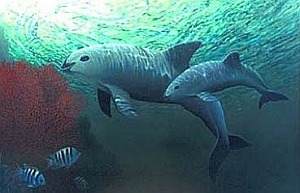Panama City, Panama - A scientific body urged Mexico and New Zealand to take immediate action to prevent the extinction of small marine mammals that are being killed by gillnets set by the fishing industry.
The International Whaling Commission voiced fears for Maui's dolphins, some of the world's rarest and smallest dolphins found only on New Zealand's North Island, and the vaquita, a small porpoise endemic to the Gulf of California.
The Commission's scientific committee estimated that New Zealand had just 55 Maui's dolphins left that are at least one year old and that Mexico had no more than 220 vaquitas, with the number declining despite conservation methods.
In a report at an annual meeting in Panama City, Panama, the committee voiced "extreme concern" over the future of the vaquita and urged the immediate elimination of gillnets that could entangle the cetaceans.
In New Zealand, the committee also called for a prompt ban on gillnets and for establishing a safe corridor for Maui's dolphins between North and South islands.
The two countries both said that they were taking action. Gerard von Bohemen, New Zealand's commissioner, pointed to a recent decision to expand a ban on fishing nets along North Island's western Taranaki coast.
Mexico's commissioner, Lorenzo Rojas Bracho, said that his country had cracked down on illegal fishing and that a working group in charge of shrimping was considering a net ban from next year.
 |
| The Maui's dolphin is one of the world's rarest and smallest dolphins and is found only in New Zealand |
Aimee Leslie, the marine turtle and cetacean manager at conservationist group World Wildlife Fund (WWF,) said that the commitments by Mexico and New Zealand were not enough.
"Unless these governments remove all gillnets now they will be responsible for the loss of these animals forever," she said.
Austria's representative Michael Stachowitsch voiced frustration over conservation efforts in Mexico and said: "Frankly, it's time for diplomatic niceties and strategies to take a back seat to immediate, concrete action."
"When a bridge collapses someone takes responsibility. When a bank or a corporation goes under, there is shame and someone takes responsibility," he said. "How much greater must the responsibility or shame be when a highly developed mammal species is lost forever?" he said.
The International Whaling Commission is known for its annual showdowns over whaling by Japan, Norway, and Iceland, but the scientific committee meets separately and is formed by experts.


